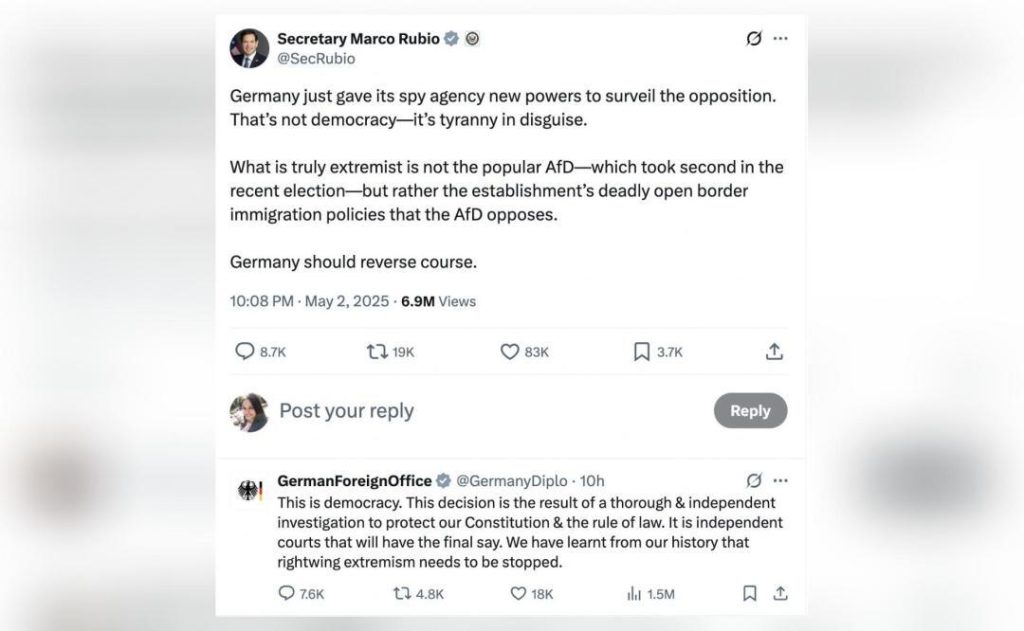
US’ Rubio & German Govt Clash Over AfD Party’s ‘Extremist’ Tag
A heated diplomatic row has erupted between the United States and Germany over the German government’s decision to term the far-right Alternative for Germany (AfD) party as ‘extremist’. US Secretary of State Marco Rubio has accused Germany of enabling “tyranny in disguise” by labeling the AfD party as extremist, sparking a strong reaction from the German Foreign Ministry.
The controversy began when Germany’s domestic intelligence agency, the Federal Office for the Protection of the Constitution (BfV), announced that the AfD party had been classified as an ‘extremist’ group due to its alleged promotion of hate speech, anti-immigrant rhetoric, and anti-Semitic views. The BfV’s decision was based on a thorough investigation aimed at protecting Germany’s Constitution and democratic values.
However, US Secretary of State Marco Rubio took to Twitter to express his strong disapproval of the German government’s decision. Rubio, who is known for his hawkish views on national security, accused Germany of enabling “tyranny in disguise” by labeling the AfD party as extremist. He tweeted, “Germany’s decision to label the AfD party as ‘extremist’ is a grave mistake. It’s a threat to democracy and a blow to free speech. Tyranny in disguise.”
Rubio’s remarks were met with strong pushback from the German Foreign Ministry, which issued a statement defending its decision to classify the AfD party as extremist. The statement read, “[The decision regarding AfD] is a result of thorough investigation to protect our Constitution. We will not be swayed by political pressure or personal opinions.”
The spat between Rubio and the German government has sparked a heated debate about the definition of extremism and the limits of free speech. While some have argued that the AfD party’s ideology is inherently extremist and poses a threat to democracy, others have defended the party’s right to free speech and criticized the German government’s decision as an attempt to stifle political dissent.
The controversy comes at a time when the AfD party is gaining popularity in Germany, with some polls indicating that it could win as many as 15% of the vote in the upcoming federal elections. The party’s leader, Alexander Gauland, has been accused of making anti-Semitic remarks and promoting hate speech against immigrants and minorities.
The German government’s decision to classify the AfD party as extremist has sparked a heated debate about the limits of free speech and the definition of extremism. While some have argued that the AfD party’s ideology is inherently extremist and poses a threat to democracy, others have defended the party’s right to free speech and criticized the government’s decision as an attempt to stifle political dissent.
The controversy has also raised questions about the role of intelligence agencies in monitoring political parties and the limits of their powers. The BfV’s decision to classify the AfD party as extremist was based on its alleged promotion of hate speech, anti-immigrant rhetoric, and anti-Semitic views. However, some critics have argued that the agency’s decision was based on flawed methodology and political bias.
In conclusion, the row between US Secretary of State Marco Rubio and the German government over the AfD party’s ‘extremist’ tag highlights the complexities of defining extremism and the limits of free speech. While the German government’s decision to classify the AfD party as extremist may have been motivated by a desire to protect democracy and democratic values, it has also sparked a heated debate about the limits of state power and the role of intelligence agencies in monitoring political parties.



